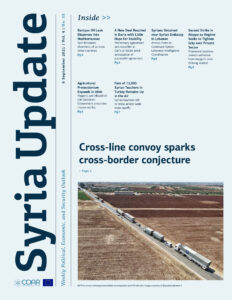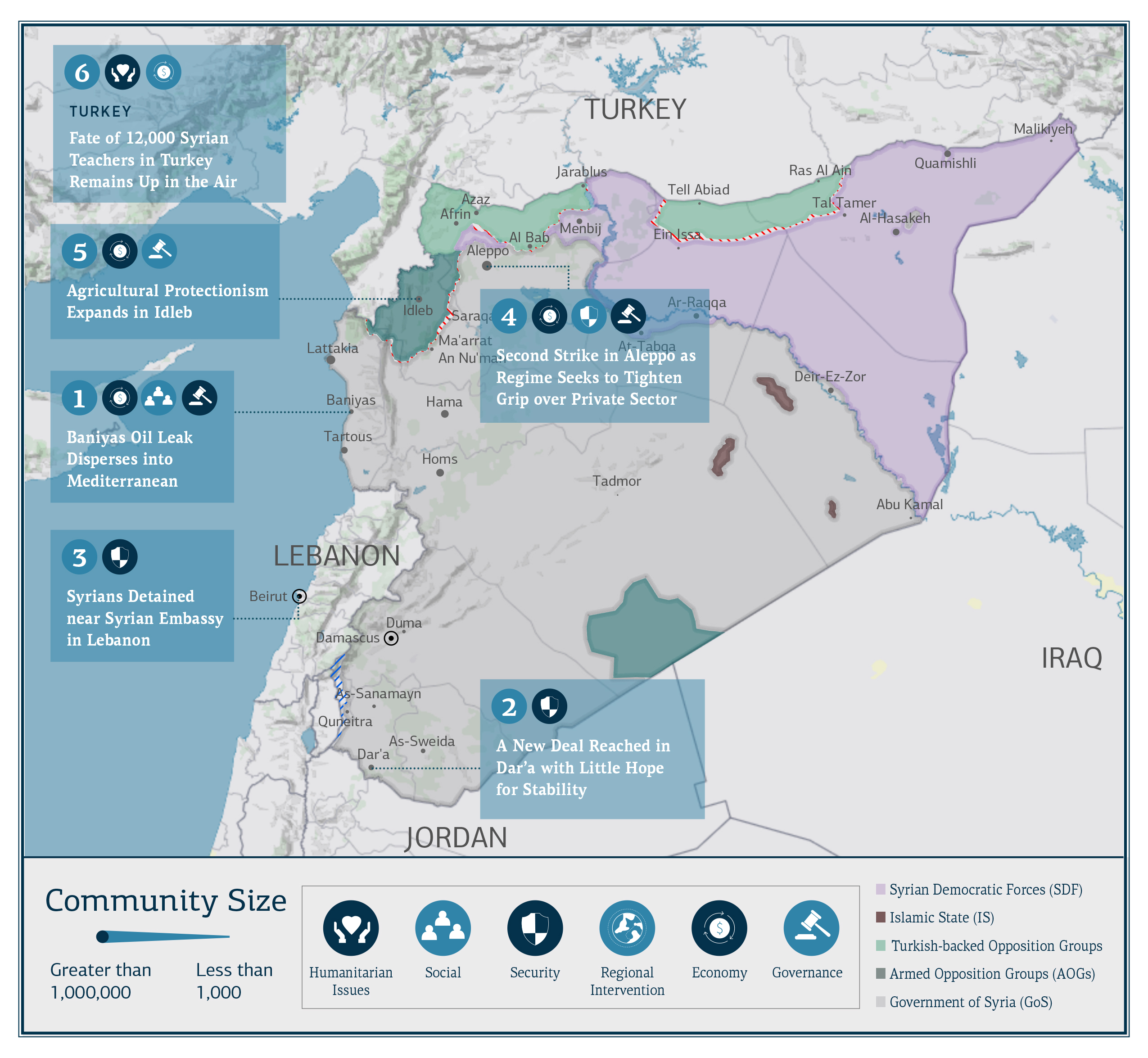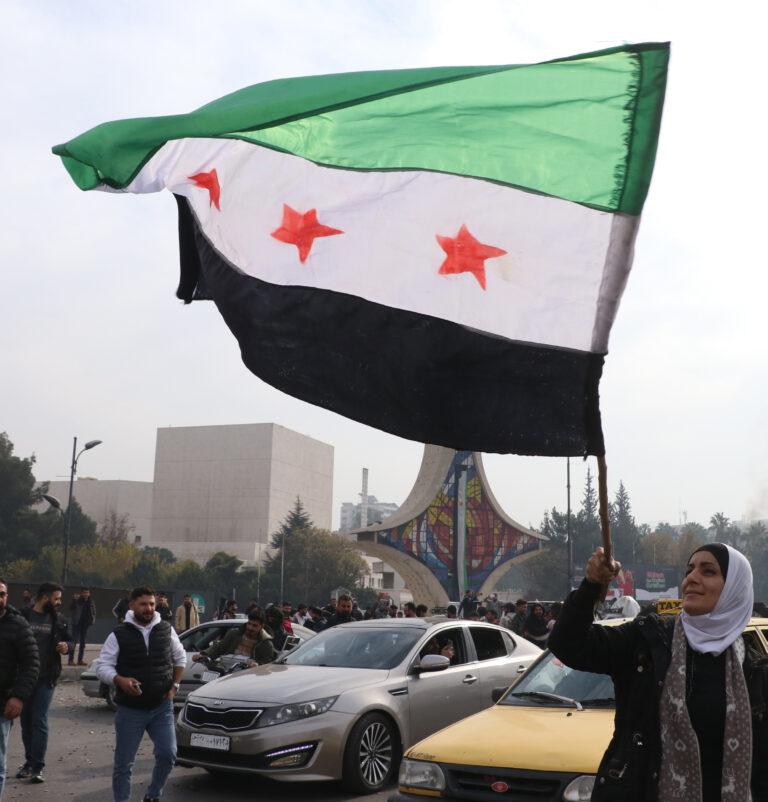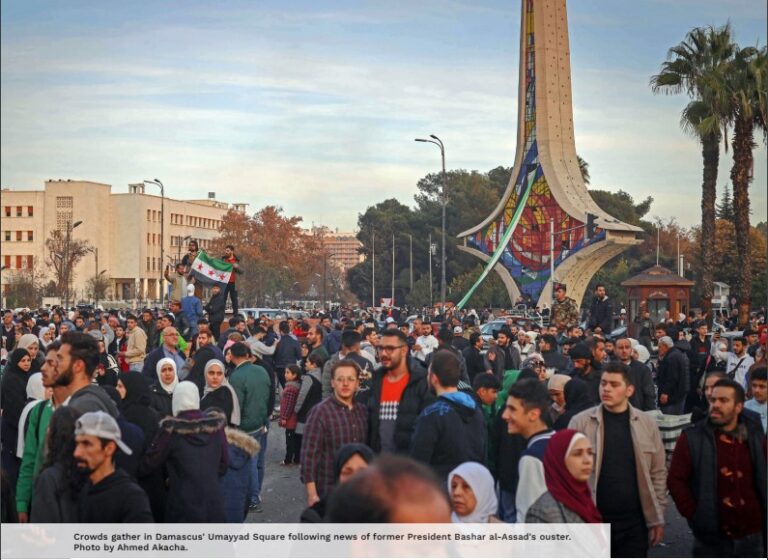In-Depth Analysis
On 30 August, a World Food Program (WFP) aid convoy crossed from the Government-controlled Aleppo countryside into Ha’yat Tahrir al-Sham (HTS)-controlled northern Idleb via the village of Maaret Elnaasan. A total of 15 trucks were sent to warehouses in the city of Sarmada and were reportedly loaded with food baskets for 9,600 families. It is understood the items will be jointly distributed by the Syrian Arab Red Crescent (SARC) and WFP partner organisations. Despite supplying much-needed relief, the convoy has been slammed by residents and aid groups concerned that it signals the further erosion of the cross-border mechanism and goes some way towards legitimising the Syrian Government’s preferred methods of relief management.
In Idleb, civilians reacted angrily to the manner in which the convoy arrived, accusing HTS and the Salvation Government (SG) of opening a crossing with the regime and allowing the hand of Damascus to orchestrate regional humanitarian affairs. The SG has denied these allegations, insisting the convoy was simply undertaken as part of standard WFP re-warehousing operations. Yet its response has done little to assuage the anxieties of aid workers and activists, many of whom worry that the mechanism which has for years been integral to their efforts may finally be nearing the end of the road.

Treading new lines in cross-border politics?
Apprehension over the sustainability of the cross-border mechanism is nothing new, but events surrounding the 30 August convoy present cause for renewed concern. Indeed, it is the first relief mission to arrive in Idleb following implementation of UNSC Resolution 2585 in July, and was welcomed by pro-regime media as an important step towards the fulfilment of Syrian Government ambitions “to stop the illegal use of Syrian borders for cross-border aid delivery which is inconsistent with the international charters and norms.” The convoy also arrived just one day after Martin Griffiths, UN Under-Secretary-General for Humanitarian Affairs and Emergency Relief Coordinator, met with Syria’s Foreign Minister, Faisal Miqdad, and reportedly expressed an interest in “securing the necessary funding for humanitarian work in Syria, moving to more early recovery projects, and securing basic services, especially in the fields of health and education”.
The Salvation Government may have dismissed the WFP convoy as a purely technical exercise, but the political sensitivity of cross-border relief entails that the event is potentially more meaningful than these authorities are willing to admit. Extension of the cross-border mechanism in July was agreed primarily by negotiation between the U.S. and Russia and its survival rests on the correlation of the two parties’ competing ambitions in Syria. Naturally, Russia’s desire to bring foreign relief under full Syrian Government control means it will view events surrounding the WFP convoy favourably, and it may seek to emphasise the ‘success’ of such cross-line operations in order to further imperil the cross-border mechanism. Russian influence over the administration of international relief to Syria may further benefit from an ostensibly more pliable U.S. policy on Syria’s reconstruction, as indicated by recent U.S. approval of natural gas transit via Syria into Lebanon, as well as ongoing discussions with the World Bank on the rehabilitation of Syrian and Lebanese gas and electricity infrastructure. Indeed, it may be that the U.S. is increasingly inclined to yield humanitarian space in return for concessions from the Syrian and Russian governments in an attempt to jumpstart a political solution to the Syrian crisis.
Ultimately, it remains to be seen whether further cross-line convoys will enter Idleb. If they do increasingly substitute for cross-border relief operations however, concerned aid agencies will need to adjust to an apparent shift in strategy at the intergovernmental level. Were the existing cross-border mandate furthermore terminated early next year, aid agencies will face a range of difficult choices. Observers rightly fear the imposition of a Damascus-based cross-line aid response that will be neither neutral nor impartial (see: Damascus’ Weaponization of Humanitarian Aid Should be the Focus of Upcoming UN Cross-Border Resolution Debate, while an increase in cross-line aid will have significant economic consequences in the northwest. Existing aid programmes and international funding streams will be forced to adapt to new realities, NGO employment will dry up, and local market procurement will shrink. As such, the cross-line/cross-border issue remains one to watch throughout the latter part of 2021 and demands concerted planning from donors, international organisations, and local partners alike.
Whole of Syria Review

Baniyas Oil Leak Disperses into Mediterranean
Baniyas refinery, Tartous: On August 23, a leak from a fuel tank at the Baniyas power plant in Tartous discharged as much as 12,000 cubic metres of oil into the Mediterranean Sea. Satellite imagery released several days after the leak showed a spill of around 1,000 square kilometres drifting from the Syrian coastline towards northern Cyprus and Turkey. One week after the event, the Syrian Energy Minister promised to intensify offshore cleaning efforts after images emerged showing people cleaning shorelines with shovels and small machinery. Notably, Baniyas power plant had been saved from shutdown in mid-2020 after a series of repairs were made to plant infrastructure. The state had celebrated these repairs as a demonstration of its perseverance in spite of mounting political and economic difficulties. However, details regarding the repairs remain unclear, and last week’s events suggest much more needs to be done to ensure the continuity and safety of the country’s principal refinery.
Environment counts cost of Syria’s disrepair
The Baniyas leak provides yet another reminder of the impact of conflict on Syria’s natural environment. Underwater explosions damaged pipelines serving the Baniyas refinery in January 2020, while a fire at the Homs refinery in May 2021 was sparked by a crude oil leak from a refinery tank. Both incidents not only weakened the integrity of key energy infrastructure, but have likely had severe effects on local water sources, marine life, and soil quality. Beyond Baniyas, the proliferation of makeshift oil refineries in northeast Syria has also caused palpable damage to crops, air quality, and groundwater resources. Pollutants from spills and explosions at these ad-hoc facilities further present public health risks and are thought to have exacerbated food production challenges in areas crucial to food security.
Dilapidation of key Syrian infrastructure remains a chronic developmental challenge nationwide, yet is compounded by dwindling state capacity in Government-controlled areas and the complexity of cross-line infrastructure management. Paired with a general lack of planning for disaster risk response by both aid agencies and governmental authorities, the frequency and environmental damage caused by incidents like that at Baniyas are likely to increase.
A New Deal Reached in Dar’a with Little Hope for Stability
Dar’a Governorate: On 5 September, local media sources reported that the Central Negotiations Committee in Dar’a and the Syrian Government forces’ Security Committee had reached a new agreement in Dar’a al-Balad through Russian mediation. The agreement stipulates establishing nine military outposts for Government forces in Dar’a al-Balad, local fighters handing over personal weapons, determining the status of all Dar’a al-Balad residents, lifting the siege, and ending the military escalation.
The new agreement came after the rapid collapse of several prior ones reached over the last two weeks, most recently on 1 September. Following the collapse of each agreement, Syrian Government forces have escalated their attacks on Dar’a al-Balad, deploying surface-to-surface missiles and 4th Division troops to attempt on-the-ground advances. In the latest such assault, at least three civilians were killed and dozens were injured.
Breaking the deadlock
The latest agreement is the fourth such attempt by the Central Committee and the Syrian Government to bring an end to the violence in Dar’a Governorate. As ever, its success will depend on whether Damascus and its allies are determined to fully retake Dar’a Governorate, or are willing to accept the status quo. At present, it seems the former is more likely. Recently leaked statements by the Russian officer in charge of southern Syria indicate that the Government will eventually take full control of Dar’a Governorate, a shift in the Russian position from guaranteeing the implementation of the 2018 reconciliation agreement to full-fledged Russian support for Damascus’s return to southern Syria.
For the time being, no agreement appears set to prevent tensions in communities beyond the reach of Damascus. The Syrian Government remains committed to accomplishing compliance and dissolving local dissent, as evidenced by its efforts to establish checkpoints and enforce disarmament. Yet Dar’a’s opposition strongholds continue to resist the imposition of unfavourable deals and remain opposed to a full Government return. It is likely that the situation in Dar’a al-Balad will be reproduced in nearby areas like Tafas and Jasem, and that the messy struggle for dominance in the south will continue.
Syrians Detained near Syrian Embassy in Lebanon
Beirut, Lebanon: On 6 September, Lebanese General Security reportedly threatened to deliver six men to the Syrian Government if they were unable to secure passage to another country within 24 hours. The men were reportedly detained by Lebanese intelligence services near the Syrian embassy in late August. The men are reportedly former members of the armed opposition in Dar’a, and reconciled with the Syrian Government in 2018. One of the men is Tawfiq al-Hajji, a former Southern Front leader, and two are former members of the Russian-backed 8th Brigade. Local sources indicate that the detainees had entered Lebanon illegally with the intention of securing a passport from the Syrian embassy for onward travel. The men’s whereabouts are unknown at the time of writing. Human rights activists in Lebanon and Syria have accused the Lebanese intelligence services of kidnapping the men, possibly following a tip-off from the Syrian embassy in Beirut.
An Abiding Threat to Refugees
Although Lebanon has long served as a destination for refugee Syrians seeking safety and economic opportunity, Syrian security agencies have sustained their historic relationship with their Lebanese (and Hezbollah) counterparts throughout the conflict. The two countries’ alleged coordination in the case above is therefore unsurprising, and serves as a reminder of the security risks facing many Syrian refugees in Lebanon, in particular those previously involved with the Syrian opposition. Indeed, detention of the six men illustrates the extent of the Syrian Government’s jurisdiction over those whom it deems must answer for their crimes. For the relatively large number of Syrian refugees in Lebanon at increased risk of arrest and prosecution in Syria, the prospect of forced return therefore looms large and compounds the myriad challenges emerging from structural discrimination and economic crisis in Lebanon.
Second Strike in Aleppo as Regime Seeks to Tighten Grip over Private Sector
Aleppo Governorate: Shop owners and traders in Aleppo are reportedly taking part in an open-ended strike against state-imposed financial and security pressures, price fluctuations, and a lack of imported goods and materials. The strike follows a series of events impacting the city’s business owners. On 28 August, media sources reported that the Ministry of Finance had frozen the assets of 650 individuals who owned or invested in fuel stations and transport companies in Aleppo after accusations that around three billion Syrian Pounds (SYP) of fuel had been sold on the black market. In addition, on 31 August, the state froze assets of the owners of the Al Wazir detergent company, a prominent Aleppan business, for violating import regulations. The state requested the company to pay more than seven billion SYP in fines and taxes. The same week, dozens of Aleppan traders and industrialists were reportedly blackmailed by security branches to pay additional taxes and provide ‘donations’ to ‘support the government.’
Drying up economic capital
Once a hub for Syrian commerce and production, Aleppo’s economy has dramatically deteriorated owing to its disengagement from historical commercial partners such as Turkey and Syrian coastal towns, the physical destruction of factories and markets, the reduction of its labour force, and Syria’s broader economic collapse. The state has played a decisive role in compounding Aleppo’s economic struggles and pushing the majority of the city’s traders and industrialists either to the brink of bankruptcy or to leaving the city entirely. For instance, on 31 August, Hisham Dahman, a prominent Government loyalist and Aleppan industrialist, died of a heart attack weeks after he was forced to suspend his business following an order to pay billions of pounds in taxes.
In order to offset a reduction in state revenues, the Syrian Government has systematically targeted Aleppo’s businessmen by confiscating their assets or imposing taxes and fees on their operations (see: Syria Update 11 January 2021). This policy will guarantee an immediate influx of cash for the Government (see: Syria Update 5 October 2020), but will also devastate local enterprises and bankrupt businessmen who might have otherwise played a role in Syria’s longer-term economic recovery. According to a local investigation, around 40 percent of the factories located in Sheikh Najjar have suspended their activities over the last two years. The industrial hub had previously sustained more than 20,000 jobs. As pressure on the private sector mounts, local businessmen once regarded as allies of the state have become increasingly vociferous in their criticism of the Syrian Government. Shortly after Hisham Dahman announced he would be suspending his business operations, Fares Shihabi, a former Member of Parliament and the Head of the Aleppo Chamber of Industry stated that “suspending productive facilities during these tough times is a red line.”
Agricultural Protectionism Expands in Idleb
Idleb Governorate: Civilians transporting agricultural goods were left stranded at the Ghazawiyet crossing linking Afrin with Idleb governorates on August 19 following imposition of a Salvation Government ban on the import of pepper and mloukhieh from northern Aleppo. In effect from 1 August to 15 September, the SG’s Ministry of Agriculture has introduced the ban in order to “protect the interests of Idleb’s farmers” and complements a prior mandate banning onion and potato imports between May and October. While entry by commercial trucks is completely banned, individuals transporting banned items for personal consumption may cross after paying a 10 USD per tonne royalty at HTS-run checkpoints.
Prices of temporarily banned goods have risen sharply in Idleb’s markets, sparking frustration amongst Idleb residents who rely heavily on pepper and mloukhieh as essential ingredients. Idleb’s farmers, meanwhile, have welcomed the decision, which helps to partially offset last year’s financial losses and reduces competition with neighbouring regions where prices are lower. For example, the price of pepper in Idleb reaches 3 Turkish lira (TL), compared to less than 0.75 TL in A’zaz.
Protecting the interests of whom?
The SG’s recent decision must be viewed in the context of broader efforts to regulate one of Idleb’s primary revenue-generating sectors. While the SG justifies its import bans as aimed at protecting agricultural production, many in Idleb are sceptical about the actual economic benefits while others accuse the SG and HTS of manipulating local markets in order to generate higher revenues for its affiliates as opposed to local producers. In recent years, HTS has established control over large agricultural holdings belonging to displaced people in areas such as Bennsh, Foah, and Kafraya. These lands are either rented to local farmers or receive investment from HTS-affiliated businessmen. Similarly, trade in locally produced foods and much-needed resources such as fuel are increasingly monopolised by traders and companies linked to HTS. Such monopolisation appears to extend even beyond immediate areas of HTS control: on 4 August, HTS dismantled three gas stations located in areas controlled by Faylaq al-Sham in Daret Azza because their owners were selling cheaper fuel than that available in Idleb’s gas stations. Ultimately, however, hardening borders between areas portrayed as unified opposition-controlled areas comes at a cost to Syrians on both sides of the line, reducing purchasing power and deepening social isolation whilst also fragmenting crucial components of the local Syrian economy and related service provision.
Fate of 12,000 Syrian Teachers in Turkey Remains Up in the Air
Turkey: In July 2021, the contracts of more than 12,000 Syrian teachers were terminated early. The contracts had been funded by the EU programme, PIKTES (Project on Promoting Integration of Syrian Kids into the Turkish Education System). PIKTES had sought to integrate Syrian children into the Turkish education system through support from Turkish and Syrian teachers. Last week, however, a local committee representing Syrian teachers in Turkey, the Syrian Educational Committee, announced that new contracts would be signed with at least 7,000 former PIKTES grantees, but that the details had yet to be finalised. At present, it appears that the new programme will employ only teachers in possession of a degree whilst those without a degree may serve in educational centres for students who have dropped out of the formal education system.
Integrating students but marginalising teachers
The Syrian Educational Committee’s decision sheds light on the broader dynamics between the Turkish state and the Syrian teacher in Turkey. Since 2015, Turkey has gradually closed all Syrian private and interim schools established since the start of the conflict, with the aim of enrolling Syrian students in the formal Turkish educational system. The PIKTES programme aimed to support this transition, enabling Syrian teachers to teach in Arabic and serve in teaching support roles. At approximately 243 USD per month, the teachers’ compensation was well below Turkey’s 2021 net minimum wage of around 340 USD however. According to the United Nations Human Rights Council (UNHCR), more than 750,000 Syrian students enrolled in Turkish schools for the 2020-2021 academic year.
The termination of the PIKTES programme has jeopardised the livelihoods of thousands of Syrian households and removed an opportunity for donors to invest in the integration of both Syrian teachers and students. A framework for cooperation that permits Syrian teachers to enter the formal Turkish educational system therefore remains necessary, and the Turkish government should be encouraged to support efforts to integrate and improve the language skills of young Syrians. Recognition of Syrian teaching degrees would constitute another important step in creating sustainable employment for Syrian educators.
Open-Source Annex
Key Readings
The Open Source Annex highlights key media reports, research, and primary documents that are not examined in the Syria Update. For a continuously updated collection of such records, searchable by geography, theme, and conflict actor, and curated to meet the needs of decision-makers, please see COAR’s comprehensive online search platform, Alexandrina, at the link below..
Note: These records are solely the responsibility of their creators. COAR does not necessarily endorse — or confirm — the viewpoints expressed by these sources.
Ibn al-Nafees Hospital Transferred to an Isolation Centre in Response to a Surge in COVID-19 Cases
What Does It Say? The hike in the daily recorded COVID-19 cases in Damascus, which at least doubled this week according to official statistics, forced the Ministry of Health to shut down operations at Ibn al-Nafees Hospital and transfer it to an isolation centre for COVID-19 patients.
Reading Between the Lines: The Government’s continued reluctance to impose new restrictions and provide accurate statistics on new COVID-19 cases was roundly criticised by medical officials in Damascus.
Child Soldiers Continue to be Deployed to Libya
What Does It Say? Despite the suspension of military operations in Libya, Russia and Turkey continue to recruit and send new mercenaries to Libya, including children who are allocated to auxiliary forces, alert groups, and special intrusion units.
Reading Between the Lines: Children are contracted for three to six months with salaries reaching 850 USD. According to eyewitnesses, children serve as guards, logistical support, and even frontline soldiers.
The Families of Rastan and the Syrian Regime: Transformation and Continuity
What Does It Say? Reliance on local intermediaries has been one of the most effective tools utilised by the Syrian regime over the past few decades to maintain control over Ar-Rastan. Although these networks failed to contain the 2011 uprising, they eventually facilitated the May 2018 reconciliation agreement.
Reading Between the Lines: When the Government recaptured the city, its network of local intermediaries was reconfigured, giving rise to a new local committee that is politically loyal to the Government, but lacks a local power base.
Are Syrian jihadis ready to take the fight to Afghanistan?
What Does It Say? The recent attack on the Kabul airport intensified fears about the threat of the estimated over 10,000 foreign fighters who remain in Afghanistan. Syrians and foreign jihadis who previously fought in Syria will likely be drawn to Afghanistan due to the Taliban’s victory.
Reading Between the Lines: The recent territorial defeat of the Islamic State and the systematic targeting of jihadi groups in Idleb by HTS may constitute a major incentive for relocation to Afghanistan. Countries such as Turkey with an interest in diminishing their threat in Syria may be prepared to facilitate their transit.
Remittances to Northeast Syria
What Does It Say? Almost all families in northeast Syria are financially reliant on remittances from relatives in Kurdistan and European countries. According to local estimates, more than 400,000 USD is transferred to northeast Syria each day through formal channels.
Reading Between the Lines: The financial assistance received by families in northeast Syria plays a vital role in their economic survival, but the rapid depreciation of the Syrian currency and dearth of many essential goods diminishes its effect.
Heated Conflict or Consolidation of the Status Quo in Northeast Syria: What is next for the AANES?
What Does It Say? The article discusses the current economic hardships affecting the Autonomous Administration and potential ramifications for continued protests by Arab tribes in the northeast.
Reading Between the Lines: The Syrian Government is likely taking advantage of the deteriorating economic conditions in Autonomous Administration-controlled areas to encourage dissent among the Arab tribes there.
Giant Puppet Ruffles Some Feathers on a Long Walk Through Greece
What Does It Say? A large puppet of a Syrian refugee girl called Amal has started its 5000 mile journey from Turkey to England.
Reading Between the Lines: The puppet symbolises the ongoing refugee crisis, an issue likely to worsen due to the circumstances in Afghanistan.





